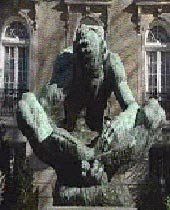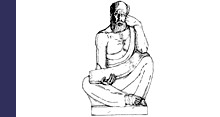 Jerome
also studied Aramaic and could read it competently, but he admitted
having a problem with pronunciation. He could speak Syrian and
had some acquaintance with Arabic.
Jerome
also studied Aramaic and could read it competently, but he admitted
having a problem with pronunciation. He could speak Syrian and
had some acquaintance with Arabic.
What
made Jerome the logical choice for the pope's commission in addition
to his linguistic competence in the languages of the East was
his training in the Latin classics. He began his study of rhetoric
in Rome when he was a boy of 12. Donatus, his teacher, was a famous
Latin grammarian.
Jerome
seems to have reproached himself later in life for the secular
color of his education. He wrote that he spent his youth in the
company of grammarians, rhetoricians and philosophers. He once
had a nightmare in which he saw himself before the judgment seat
of God, who asked Jerome, "Who are you?" Jerome replied,
"A Christian," but God corrected him: "You are
a liar. You are not a Christian but a Ciceronian."
 When
Jerome awoke, he promised to read the books of God with greater
fervor than he devoted his study of "the books of men."
Jerome was uniquely prepared to translate the Scriptures into
Latin because he was both a Christian and a Ciceronian. The touch
of an outstanding linguist and scholar-like the Roman Cicero-was
sorely needed.
When
Jerome awoke, he promised to read the books of God with greater
fervor than he devoted his study of "the books of men."
Jerome was uniquely prepared to translate the Scriptures into
Latin because he was both a Christian and a Ciceronian. The touch
of an outstanding linguist and scholar-like the Roman Cicero-was
sorely needed.
Jerome
fulfilled his commission by producing a revision of the Gospels.
He took care to concern himself not only with his literary craft
but also with his own moral response to the Gospel. He must have
enjoyed his work because he produced a Latin translation of the
Psalms and a few Old Testament books, too. This experience led
Jerome to commit himself to a project that occupied him for more
than 20 years and proved to be his lasting claim to fame: the
translation of other parts of the Bible from the original languages
into Latin.
In
the case of the Old Testament, Jerome decided that his translation
had to consider the Hebrew version of the books. He could not
rely on the Septuagint alone. This was not an easy or popular
decision. Christians accorded a high status to the Septuagint.
Many thought that this Greek version of the Old Testament was
itself inspired, making any reference to the Hebrew version unnecessary.
Jerome disagreed.
At
a time when there were conscious efforts to distance the Church
from its Jewish background, Jerome not only went to the Hebrew
Bible, but also sought help with difficult texts from Jews. In
particular, Jerome acknowledged his debt to his Jewish teachers
for helping him with the Book of Job whose Hebrew is difficult.
The
result of efforts to provide a new Latin translation of the Bible
is popularly known as the Vulgate, a word derived from the Latin
and meaning "common" or "commonly known."
But Jerome was not responsible for the Vulgate as it has come
down to us. The only New Testament books he worked on were the
Gospels. It is natural to assume that, after completing his work
on the Gospels, Jerome would have then turned to the rest of the
New Testament, but there is little evidence that he did. After
he published his revision of the Old Latin Gospels, Jerome turned
to the Old Testament. In the course of 15 years of work, Jerome
translated all the books of the Hebrew Bible.
Jerome
was more than a translator of the Bible. He was a gifted interpreter
as well. His major contribution was a series of commentaries on
the prophets. At first, Jerome followed the approach common in
his day. For example, his commentary on Obadiah was allegorical.
He ignored the historical dimensions of the prophet's words and
focused on a spiritual interpretation that sought to edify readers.
While
Jerome never completely abandoned allegorical interpretation,
his work as a translator led him to appreciate the historical
and literal approach more. He sought to understand the biblical
text in its original cultural and historical setting. Many students
of the Bible find Jerome's commentaries still helpful.
There
is no other person who has had greater influence on the way Catholics
read the Bible than St. Jerome. He had worried that his influence
would be restricted to aesthetics rather than to faith. His worries
were groundless because Jerome was a sincere believer who used
his talent and education to help other believers find, as he did,
that the Scriptures are the Word of God-the word of life.
Jerome
traveled extensively in Palestine, marking each spot of Christ's
life with an outpouring of devotion. Mystic that he was, he spent
five years in the desert of Chalcis so that he might give himself
up to prayer, penance and study. Finally he settled in Bethlehem
where he lived in the cave believed to have been the birthplace
of Christ.
On
September 30, 420, Jerome died in Bethlehem. [His feast is now
celebrated on September 30.]
TOP
HOME



